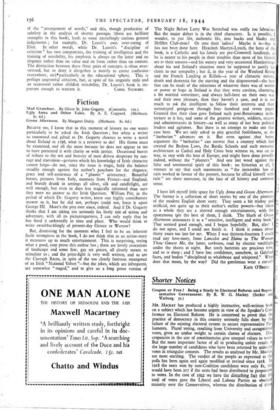Fiction
Mad Grandeur. By Oliver St. John Gogarty. (Constable. ros.) Ugly Anna and Other Tales. By A. E. Coppard. (Methuen. 8s. 6d.) Green Afternoon. By Margaret Duley. (Methuen. 8s. 6d.)
BELIEVE me, I know that in this moment of history no one wants particularly to be asked the Irish Question ; but when a writer so renowned and gifted as Dr. Gogarty chooses to write a novel about Ireland in 1798, what is a reviewer to do? His theme must be examined, and all the more because he does not appear to me to have presented it with clarity or with justice. Occasional bursts of tribute to the wit and bravery of men driven desperate by out- rage and starvation—gestures which his knowledge of Irish character cannot forgo—do not, since the issue is tragic, hold the balance steadily enough against the author's penchant for the elegance, grace and self-assurance of a " planter " aristocracy. Beautiful horses, pictures from Italy, manners from France—and England, and brandy drunk in settings all silver, silk and candlelight, are well enough, but even in days less tragically informed than ours they were no answer to the Irish Question. William Pitt, in the period of which Dr. Gogarty writes, knew one highly contributory answer to it, but he did not, perhaps could not, force it upon George III. More's the pity ever since, indeed. And if Dr. Gogarty thinks that I am taking too seriously his lively talc of action and adventure, with all its picturesqueness, I can only reply that he has fixed it awkwardly in time and place. Who would think to write swashbucldingly of present-day Greece or Warsaw?
But, dismissing for the moment what I feel to be an inherent facile wrongness in the book, I do not think that as an action-story it measures up to much entertainment. This is surprising, seeing what a good, easy prose this author has ; there are lovely evocations of landscape and some fine, gay set pieces, all clearly meant to stimulate us ; and the prize-fight is very well written, and so are the Curragh Races, in spite of the too clearly foreseen emergence of an Irish "National Velvet "—but the jokes, which are infrequent, are somewhat "staged," and to give us a long prose version of The Night Before Larry Was Stretched was really too laborious. But the major defect is in the Chief characters. Is it possible, I wonder, to put life, authentic life, into bucks and blades and Hellfire Club-men? Or into their ladies? Maybe it is—but it has not been done here. Hyacinth Martyn-Lynch, the hero of the book, is a Catholic and his family are pre-Cromwell landlords, s he is nearer to his people in their troubles than most of his friend, are to their tenants—and his watery and very occasional Hamletisingi about his and Ireland's situation must be supposed to justify ho claim to our sympathy ; but if, in the year of the Wexford Rising and the French Landing at Killala—a year of climactic misery, death and dementia for the starving and the dispossessed—the best that can be made of the inheritors of whatever there was of wealth or power or hope in Ireland is that they were careless, charming, a bit worried sometimes, and always hell-bent on their own way and their own pleasure, then they haven't a case, and it is toe much to ask the intelligent to follow their interests and their stereotyped goings-on through four hundred and seven pages. Granted that their class gave Ireland such post-Renaissance archi- tecture as it has, and some of the greatest writers, soldiers, orators and administrators in history--as well as many of her best political leaders and agitators. But there is no attempt to make out that case here. We are only asked to pity graceful foolishness, as the "barbarian " advances on it. But even against that better argument the " barbarian " can answer that a country which had created the Brehon Laws, the Bardic Schools and such monastic architecture as Cashel and Holy Cross bear witness to, was on its way, in step with the best of Europe, and might have done proudly indeed, without the "planters." And one last word against the false and sentimental spirit of this book: no historian at all, I venture to say that such statements as "the inexorable law of ruin worked in favour of the peasant, because he allied himself with ruin" are sheer nonsense, in the face of all history and common sense.
I have left myself little space for Ugly Anna and Green Afternoon The former is a collection of short stories by one of the pioneer, of the modern English short story. They seem a bit tricksy and artificial, not quite up to their author's earlier powers—but taken as a whole they are a shrewd enough entertainment, with the eponymous tile the best of them, I think. The blurb of Green Afternoon announces it as a "sensitive, intelligent and witty book." That seemed good enough, and I began hopefully. But, alas! I do not agree, and I could not finish it. I think it comes about thirty years too late for me. When I was thirteen-fourteen I could read any love-story, from Lancelot and Elaine to The Woman Thor Gayest Me, the latter, verboten, read by electric torchlight under the sheets at night. But torch batteries are precious now, and so is sleep ; and I have lost confidence, somehow, in Galahad faces, and bodies "disciplined to whalebone and whipcord." What does that mean, by the way? Did the gentleman wear a corset?
KATE O'BRIEN.


























 Previous page
Previous page